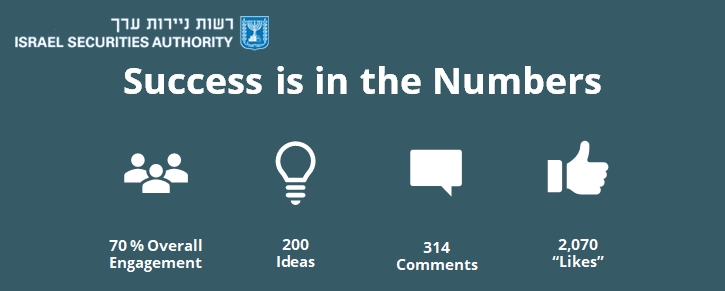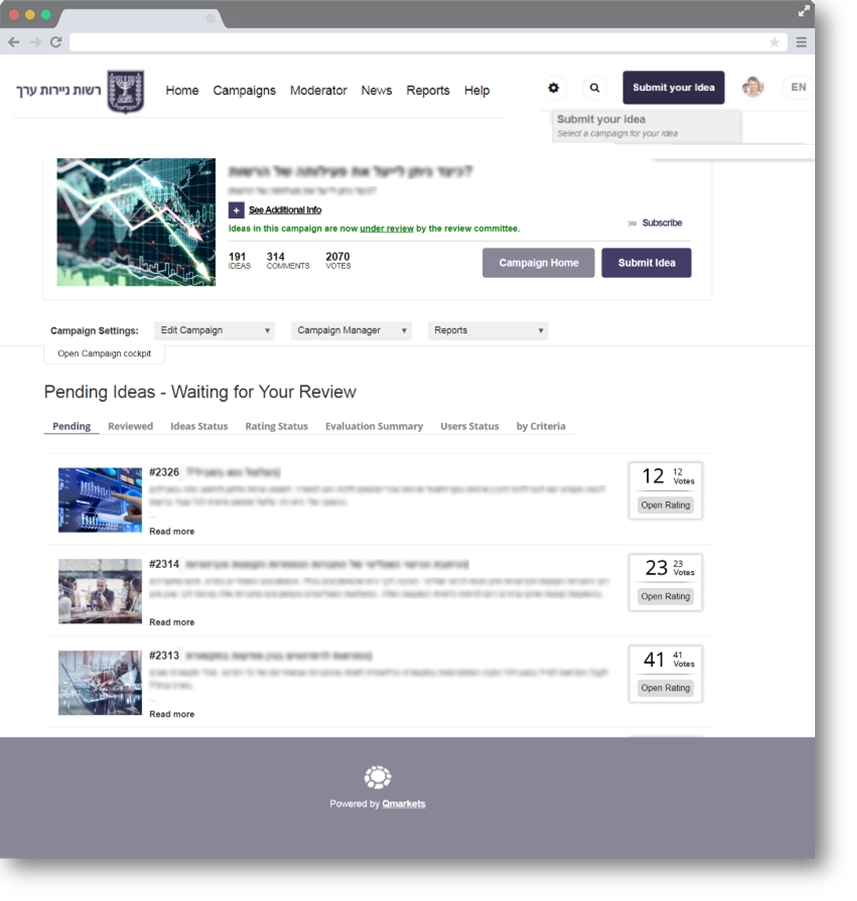Yael Weiss Efron is an Innovation Manager at the Israel Securities Authority (ISA). Earlier in 2017, the ISA approached Qmarkets regarding the implementation of Qmarkets’ platform in order to run an idea and innovation management program. Following the successful launch of the program and its advancement to the next stages, we sat down with Yael in order to discuss the ISA and its unique needs from their innovation management platform, the success of the ISA’s program, and the cooperation with Qmarkets in launching their platform.
Qmarkets: What is the Israel Securities Authority?
Yael Weiss Efron: The Israel Securities Authority (ISA) is a statutory body operating in Israel, founded with the purpose of protecting the interests of the investor public. The key responsibilities of the ISA are the evaluation of financial reports of Israeli organizations, and the issuing of permits which allow these organizations to publish investor prospectuses.
The ISA also promotes legislation regarding regulation, deregulation and market development in these fields, as well as carrying out enforcement and investigatory actions. The ISA employs hundreds of accountants, economists, lawyers and experts to assist in achieving its mission.
QM: What has driven a need for innovation at the ISA?
YWE: We are not a business corporation whose main goal is to look out for the profit bottom-line, and who as a result must initiate and create innovative business processes. Even if there is no innovation at the ISA, we will still be relevant, as we are the industry regulators.
However, that is not the viewpoint of the administration at the ISA – we constantly strive not only to be relevant, but also to allow the financial markets to evolve, while adapting regulation to meet current demands. In order to do this, there must be room for creative thinking and for innovation.
It was important for us to include the employees in the process, as they are the ISA’s most valuable resource. They have the experience and the knowledge – both regarding the challenges facing the work at the ISA, as well as how to face those same challenges and solve them.
QM: How have you historically supported innovation?
YWE: 2016 was defined by us as the “Year of Creativity and Innovation” at the ISA, and administrators and senior staff were introduced to tools and brainstormed with on how to implement these tools into our ongoing work. Our project with Qmarkets was a natural continuation of this intensive year which we went through.

It was important for us to include the employees in the process, as they are the ISA’s most valuable resource. They have the experience and the knowledge – both regarding the challenges facing the work at the ISA, as well as how to face those same challenges and solve them. We saw this project as an opportunity to maintain and even reignite the passion of some of the workers at the ISA, allowing them to become an integral part in improving efficiency at the ISA and the service it provides.
QM: What made you choose to use crowdsourcing/idea management software?
YWE: This was the first time which we decided to incorporate all of our employees in the process. At this opportunity, I’d like to thank Ariel Fliegler from Rented minds, who has been accompanying the ISA during the training and implementation processes, and who helped us plan this project.
We initially considered a set of basic solutions which would comprise a foundation for leveraging the project, but we quickly realized that in order to thoroughly and completely implement an innovation project we would need an interactive program which would support the various processes: idea suggestion, idea ranking, exposing the ideas to all employees, idea segmentation and sharing the ideas.
QM: What led you to choose to work with Qmarkets?
YWE: As part of the goals of the project, we had to launch and implement the process in record time. Needless to say, we were happy to hear of a local Israeli company, Qmarkets, which is a global leader in the field of innovation management software. From that moment onwards, Qmarkets’ experience implementing similar systems in countless other companies around the globe was a great help when it came time for us to define the processes that best our requirements. As they say, we “Came for the comfort, but stayed for the rest” – the close and effective support, the system’s friendly and intuitive interface and the near-instantaneous response from a member of Qmarkets’ team to any question or request.
QM: What are your objectives for the system?
YWE: I see Qmarkets as a central system which supports the innovation process at the ISA. The goal is to carry out a number of more focused and professional projects by the end of this year. The system allows us to create interdepartmental teams, a variance in disciplines which encourages innovation and lowers the barriers inherent in a hierarchical organization. There are many advantages to the “innovative community” created around working with the Qmarkets system: creating trust between the management and employees, open communication which leads to improving the organizational culture, promoting a culture of learning, problem solving and lowering risk. The “innovative community” provides a system which allows us to deal with problems that are too large or risky to be handled by a small group.
QM: Did you use a sandbox or pilot before purchasing the main system?
YWE: We defined the first project as a pilot, and following the very high engagement rate among our employees (70% engagement overall, 20% in the idea suggestion phase) as well as the good results, we made the decision to purchase the system for a longer period.
QM: How did you engage users with your system? (Competitions, events, prizes, rewards, recognition?)
YWE: Already at the beginning of the project, even before the official project launch, it was clear that we would only see high levels of employee engagement and success if we led from the top. Therefore, I’m proud to say that the ISA senior management were completely on board: the ISA General Secretary and the Senior Advisor to the Chairman both picked up the gauntlet and “sponsored” the project.
From an intra-organizational communications viewpoint – approximately two weeks before launch we began a number of campaigns, which included “teasers” to create interest in the project without revealing too much.
Campaign examples included: “It’s all in our hands”, during which we gave out stress balls; “Refresh your thoughts”, in which popsicles were handed out, etc. In addition, we held a joint launch event which included management and employees. The event took place simultaneously in Jerusalem and in Tel Aviv, and the project sponsors presented the challenge and provided the first introduction of the Qmarkets system, the goals, and what was expected of the employees. They also presented what employees could do if they did not have an idea in mind (the possibility of contributing by commenting and advancing the discussion, or promoting other ideas), the concept of the “innovative community” and more.

QM: How did you promote the platform after launch?
YWE: The project’s launch was accompanied by two “Happy Hour” events to cultivate the community that was being formed around the Qmarkets system, at which prizes were given to encourage desired actions: greatest contributor, most discussed ideas (based on number of comments), and even the “wildest” idea. In addition, employees were shown statistics of the leading departments, something which encouraged competition and increased participation.
With regards to content, it was very important for us to have our finger on the pulse of the project, responding to the activity we were seeing: for example when we noticed that we weren’t getting enough discussion on ideas, we launched “Comments Day”. When we saw that the system lay dormant for too long, we launched a competition in which whoever suggested an idea that would receive “at least 10 likes on its first day” would receive a prize.
Of course, there is also the hackathon event we held, where project teams went through creative thinking and innovation project workshops. At this event the teams developed the ideas and presented them to the judging panel, which aside from ISA senior management also included an objective external judge, Ms. Efrat Duvdevani, Director General at the Peres Center for Peace and Innovation, who helped make the idea judging process more objective.
QM: As a government organization, are there any unique requirements which you had?
YWE: At first, I had several concerns regarding our ability, as a sensitive organization which operates using a closed IT system, to operate using a cloud-based system. To my great surprise and pleasure, along with Qmarkets’ experienced technical team, the cloud-implementation received quick approval from our Information Security team (aided by the fact that no sensitive material was uploaded to the Qmarkets system), and everything went smoothly: employees can now easily and simply log on to the Qmarkets system.
QM: How many ideas, comments and votes were submitted in the system, over how long of a period?
YWE: The project, which was run for a month, created approximately 200 ideas, 314 comments and 2,070 “Likes”.
QM: Please describe procedure you’ve agreed on, for choosing the final best ideas?
YWE: Being as this was a project which addressed all employees, we decided to trust “the crowd” to choose the best ideas. In addition, we are currently in a phase of mapping out and prioritizing the best ideas out of the 200 ideas suggested. The three ideas which are chosen as finalists will be independently examined, with the expressed goal of promoting all three of them. The leaders of the projects will be those employees who suggested the ideas.
I see Qmarkets as a central system which supports the innovation process at the ISA
QM: Can you share your some of your insights as to the outcome of the project?
YWE: I definitely see the project as a success, even at this stage. Naturally, I am unable to provide more detail regarding the areas which benefited as a result of the project, but I can say that the majority of the ideas dealt with improving the information-sharing processes within the organization, improving the data that is the basis of our oversight work, rethinking the oversight methods and even suggestions for new activity models. I particularly liked the feeling of vitality which the project gave to the employees, the feeling that they are being listened to. The project definitely contributed to increasing the feeling of belonging to the family the ISA.
—————-
The Qmarkets system laid a simple and intuitive foundation, which allowed various employees from the different departments to interact between each other in an unprecedented way. This created an independent dynamic which in turn propelled forward collaborative creative thinking processes, which led to the suggestion and development of ideas which we’re hard pressed to see how we’d have come up with in any other way.
Offir Eyal, adv.- Senior Advisor to the Chairman and Director of the International Affairs Department



